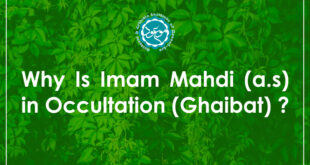The basic point upon which we have first and foremost to agree is the definition of general Emamate, then the distinctions it requires and, finally, the proofs which testify to these distinctions. It is only then that disagreeing parties can conduct a reasonable discussion.
Having been convinced by unequivocal proofs of such infallibility, and having seen the Twelve Emams (A.S.) to be fully qualified to be the only ones in whom such infallibility could be observed, we became fully convinced of their unshakable superiority over all others, and that they were the ones adorned with absolute human perfection.
An Emam, according to this viewpoint, has got to be the most learned among people and the most aware of the general needs of people such as knowledge or other necessities of life, and that he has to be the most pious, the most ascetic, the most perfect in personal conduct and norms of behaviour. In other words, in order to be qualified for Emamate, one has to be superior to everyone else in all aspects of perfection and its requirements which all raise him to his position of leadership. On this basis, the character of Emam al-Rida (A.S.), who is one of these Twelve Emams, becomes clearly distinctive due to its merits. But this is not the limit of the scope of this research; rather, we shall attempt to research his personality and the qualities which distinguished him from all others by our sifting into the legacy history has preserved for us of his conduct while still alive, and from the stances taken by the men of knowledge and by contemporary caliphs towards him.
Government’s Attitude Towards the Imam
The attitude of the then rulers towards Emam al-Rida (A.S.) and the other Emams may provide us with a clear view of the distinctions which raised their personalities to the zenith. And it is essential to explain the phenomenon of the government’s attitude towards them which manifested itself in the surveillance imposed upon them rather than upon other distinguished dignitaries or chiefs of the Alawides, monitoring their movements and counting their steps in all their social and personal encounters. What we can mention here to explain this phenomenon are the following reasons:
1) The belief of a large number of Muslims in their Emamate and in their being the most worthy of the caliphate, and their conviction that all other caliphs are considered usurpers of authority, trespassers upon the rights ordained by God to others. This is why the politicians of the time considered them their competitors whose mere presence increased the dangers surrounding them and jeopardized the security of the very existence of their government structure.
2) Their being the magnet which attracted leading scholars and thinkers who shrank in their presence despite their intellectual advancement and distinction in the fields of the arts and knowledge and despite their genius and intellectual prowess. This caused the caliphs to feel a stronger animosity towards them and be more grudgeful towards them due to the public fascination by them and to their attempts to be close to them and to being emotionally distant from the center of the government.
3) Their being the better alternative from the public’s political standpoint to take charge of the responsibilities of government, bear its burdens, carry out its obligations and doing all of that most efficiently. This frightened the rulers and made the obscure future seem to their eyes even more so.
4) The vicious incitements about them by their opponents who bore animosity towards them and who wished thereby their elimination, and the tell-tales of even some of their own kin whose judgement was blinded by jealousy, so they kept fabricating stories and attributing them to those Emams and telling them to the rulers who were pleased to hear them since they became outlets to the grudge they felt towards those Emams and, at the same time, found in them the pretexts for annihilating and harassing them and in the end a justification to put an end to their lives and rid themselves of the complex they were suffering from due to their existence.
By these and by others can we explain the phenomenon of the rulers pursuing them and desperately trying to alienate them from the stage of events affecting the nation in order to secure a distance from the ghost of competition which could haunt them had they permitted the Emams to do as they pleased. Thus can we understand the general characteristics of the significant distinctions the personalities of those Emams enjoyed in all sectors of the society in its various centers of activity and in its various aspirations; otherwise, how do you explain this phenomenon, and why should those rulers pay the Emams so much attention?
His Knowledge
He inherited the knowledge of his grandfather the Messenger of God (S.A.W.), thus becoming its pioneering fountainhead that quenched the thirst of those who were thirsty for knowledge. History narrates a great deal of his scholarly stances and intellectual discourses in which he achieved victory over those who opposed the Divine Message, excelling in various branches of scholarship with which he provided the seekers of knowledge and the thinkers of the time.
Emam Mousa a-Kazim (A.S.) is reported to have often said to his sons: “Ali ibn Mousa, your brother, is the learned scholar of the Descendants of Muhammad (S.A.W.); therefore, you may ask him about your religion, and memorize what he tells you for I have heard my father Ja’fer ibn Muhammad more than once saying, `The learned scholar of the family of Muhammad is in your loins. How I wish I had met him, for he is named after the Commander of the Faithful Ali (A.S.).'”
Ibrahim ibn al-Abbas al-Suli is reported to have said: “I never saw al-Rida (A.S.) unable to provide the answer to any question he received, nor have I ever seen any contemporary of his more learned than he was. Al-Mamoon used to put him to test by asking him about almost everything, and he always provided him with the answer, and his answer and example was always derived from the Holy Qur’an.”
Rajaa ibn Abul-Dahhak, who was commissioned by al-Mamoon to escort al-Rida (A.S.) to his court, said: “By God! I never saw anyone more pious than him nor more often remembering God at all times nor more fearful of God, the Exalted. People approached him whenever they knew he was present in their area, asking him questions regarding their faith and its aspects, and he would answer them and narrate a great deal of hadith from his father who quoted his forefathers till Ali (A.S.) who quoted the Messenger of God (S.A.W.). When I arrived at al-Mamoon’s court, the latter asked me about his behaviour during the trip and I told him what I observed about him during the night and during the day, while riding and while halting; so, he said: `Yes, O son of al-Dahhak! This is the best man on the face of earth, the most learned, and the most pious.'”18
Al-Hakim is quoted in Tarikh Nishapur as saying that the Emam (A.S.) used to issue religious verdicts when he was a little more then twenty years old. In Ibn Maja’s Sunan, in the chapter on “Summary Of Cultivating Perfection,” he is described as “the master of Banu Hashim, and al-Mamoon used to hold him in high esteem and surround him with utmost respect, and he even made him his successor and secured the oath of allegiance for him.”
Al-Mamoon said this once in response to Banu Hashim: “As regarding your reaction to the selection by al-Mamoon of Abul-Hassan al-Rida (A.S.) as his successor, be reminded that al-Mamoon did not make such a selection except upon being fully aware of its implications, knowing that there is no one on the face of earth who is more distinguished, more virtuous, more pious, more ascetic, more acceptable to the elite as well as to the commoners, or more God-fearing, than he (al-Rida, A.S.) is.”19
 Mouood Mouood English Edition
Mouood Mouood English Edition




